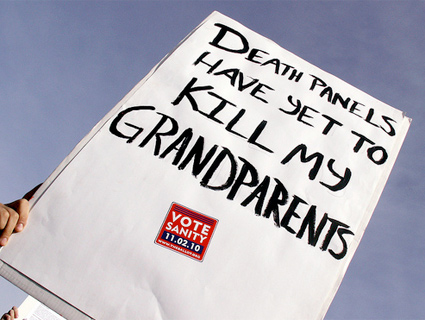Put on the defensive for supporting Paul Ryan’s drastic reforms, Republicans have been haranguing Democrats to put out their own plan to save Medicare. Democrats, in fact, do have a plan to rein in Medicare costs and make the program sustainable: it’s called the Affordable Care Act. Problem is, the centerpiece of the ACA’s strategy for containing ballooning Medicare costs has been under increasing attack—not only from Republicans, but, increasingly, allies who’ve otherwise been staunch supporters of Democratic health reform.
Politico reports that the National Committee to Preserve Social Security and Medicare, a nonprofit that supported federal health reform, is now turning against the new Independent Payment Advisory Board (IPAB), which will give a group of independent experts unprecedented power to curb Medicare costs. Politico‘s Jennifer Haberkorn explains:
For more than a year, the National Committee and other supporters of the reform law who didn’t like the IPAB were willing to put up with it for the greater good of the law. But in recent weeks, that support has waned.
“IPAB turns Medicare into a scapegoat,” said Max Richtman, executive vice president and acting CEO of the National Committee to Preserve Social Security and Medicare. “Medicare will be forced to make reductions without addressing the rest of the health care costs.”
The group also is concerned that it would be hard for Congress to overturn any decisions by the board; it would have to come up with an equal amount of savings to stop the board’s decisions.
Such opposition builds on a small but growing cohort of House Democrats who have turned against IPAB as well, signing onto a GOP bill to repeal the provision. The movement exposes the political vulnerability of a central piece of the Democratic plan for Medicare reform and long-term deficit reduction.
Though they may dismiss the GOP’s attacks on IPAB as political grandstanding, Democrats are less likely to write off concerns from groups like the National Committee to Preserve Social Security and Medicare, whose political action committee donated over $1.5 million to Congressional candidates in the 2010 campaign cycle—98 percent of it to Democrats alone. While rolling back any piece of the ACA will be an uphill battle—as the protracted battle to repeal the ACA’s 1099 tax-reporting provision proved—this development should put the White House on guard.















